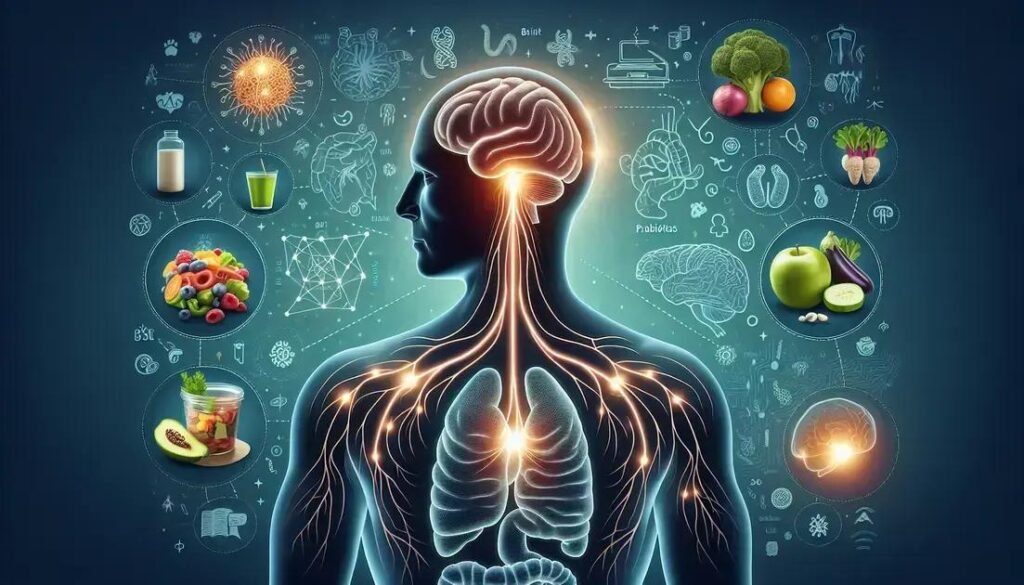Did you know that the connection between your gut and brain is more significant than you ever imagined? Research suggests that the gut and brain are intimately linked, with the gut playing a crucial role in regulating brain function and overall well-being.
In this article, we’ll delve into the fascinating world of the gut-brain connection, exploring the surprising ways in which gut health affects brain function and vice versa.
From the impact of gut health on mental health to the role of gut bacteria in the gut-brain axis, we’ll uncover the latest research and provide practical tips for optimizing your gut-brain connection.
Table of Contents
Gut-Brain Connection 101: Understanding the Basics
The gut-brain connection is a complex network that connects the central nervous system to the enteric nervous system, the latter being often referred to as the ‘second brain.’ The enteric nervous system is responsible for controlling the functions of the gastrointestinal system, including digestion, absorption, and elimination.
The connection between the gut and brain is bidirectional, meaning that information can flow in both directions. The gut sends signals to the brain through the vagus nerve, which is responsible for transmitting sensory information, such as pain, temperature, and texture, to the brain.
The brain, in turn, sends signals to the gut through the vagus nerve, influencing gut function and modulating the immune response. This bidirectional communication is crucial for maintaining overall health and well-being.
The Gut-Brain Axis: How Gut Health Affects Brain Function
The gut-brain axis is a bidirectional communication network between the central nervous system and the enteric nervous system.
The enteric nervous system, often referred to as the ‘second brain,’ produces and releases neurotransmitters that can influence mood, cognitive function, and other brain functions.
For example, the neurotransmitter serotonin, which is produced in the gut, plays a crucial role in regulating mood, appetite, and sleep.
The gut-brain axis also allows the gut to send signals to the brain, influencing brain function and modulating the immune response.
This complex interplay between the gut and brain is essential for maintaining overall health and well-being.
The Impact of Gut Health on Mental Health
Gut health has a profound impact on mental health, with research suggesting that the gut microbiome plays a crucial role in regulating mood, anxiety, and depression.
The gut-brain axis allows the gut to communicate with the brain, influencing brain function and modulating the immune response.
An imbalance of gut bacteria, also known as dysbiosis, has been linked to various mental health disorders, including depression, anxiety, and bipolar disorder.
Healthy Gut and Mental Health
On the other hand, a healthy gut microbiome has been shown to have a positive impact on mental health, reducing symptoms of depression and anxiety.
Therefore, maintaining a healthy gut through a balanced diet, probiotics, and stress management can have a positive impact on mental health.
Gut-Brain Connection and Neurotransmitters
The gut-brain connection plays a crucial role in the production and regulation of neurotransmitters, which are chemical messengers that transmit signals between neurons.
The gut microbiome produces neurotransmitters such as serotonin, dopamine, and GABA, which are essential for regulating mood, appetite, and sleep.
The gut-brain connection also allows the gut to influence the production and regulation of neurotransmitters in the brain, modulating cognitive function, mood, and emotional responses.
For example, the neurotransmitter serotonin, which is produced in the gut, has been shown to have a positive impact on mood, reducing symptoms of depression and anxiety.
The gut-brain connection and neurotransmitters work together to regulate various physiological processes, including digestion, metabolism, and immune function.
The Role of Gut Bacteria in the Gut-Brain Connection
Gut bacteria play a crucial role in the gut-brain connection, producing neurotransmitters, hormones, and other signaling molecules that communicate with the brain.
The gut microbiome is composed of trillions of microorganisms, including bacteria, viruses, fungi, and protozoa, which work together to regulate various physiological processes, including digestion, metabolism, and immune function.
The relationship between gut bacteria and the brain is bidirectional, with the brain influencing the gut microbiome through the release of neurotransmitters and hormones.
For example, the neurotransmitter serotonin, which is produced in the gut, has been shown to have a positive impact on mood, reducing symptoms of depression and anxiety.
The Influence of Gut Microbiome on the Brain
The gut microbiome also influences the brain’s reward system, regulating food intake, satiety, and metabolism.
A healthy gut microbiome is essential for maintaining overall health and well-being, and can be achieved through a balanced diet, probiotics, and stress management.
Practical Tips for Optimizing Your Gut-Brain Connection
To optimize your gut-brain connection, it’s essential to maintain a healthy gut microbiome through a balanced diet rich in fiber, polyphenols, and omega-3 fatty acids.
Probiotics and prebiotics can also help support the growth of beneficial bacteria and promote a healthy gut-brain connection.
Additionally, stress management techniques such as meditation, yoga, and deep breathing can help reduce cortisol levels and promote relaxation.
It’s also important to get enough sleep and exercise regularly to support overall health and well-being.
Furthermore, avoiding processed foods, sugar, and artificial sweeteners can help reduce inflammation and promote a healthy gut-brain connection.
By following these practical tips, you can optimize your gut-brain connection and improve your overall health and well-being.
FAQ – Frequently Asked Questions about Gut-Brain Connection
What is the gut-brain connection?
The gut-brain connection refers to the bidirectional communication network between the central nervous system and the enteric nervous system, which is often referred to as the ‘second brain.’
How does the gut microbiome affect brain function?
The gut microbiome produces neurotransmitters, hormones, and other signaling molecules that communicate with the brain, influencing mood, cognitive function, and emotional responses.
Can gut health affect mental health?
Yes, research suggests that an imbalance of gut bacteria, also known as dysbiosis, has been linked to various mental health disorders, including depression, anxiety, and bipolar disorder.
What are some practical tips for optimizing the gut-brain connection?
Maintaining a healthy gut microbiome through a balanced diet, probiotics, and prebiotics, reducing stress levels through meditation, yoga, and deep breathing, and getting enough sleep and exercise are all important for optimizing the gut-brain connection.
Can I optimize my gut-brain connection at home?
Yes, there are many simple and effective ways to optimize your gut-brain connection at home, including incorporating probiotics and prebiotics into your diet, practicing stress-reducing techniques, and getting enough sleep and exercise.
Is the gut-brain connection related to overall health and well-being?
Yes, the gut-brain connection is closely linked to overall health and well-being, and maintaining a healthy gut-brain connection is essential for maintaining overall health and well-being.



